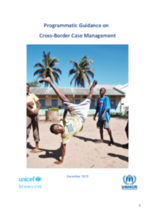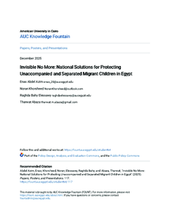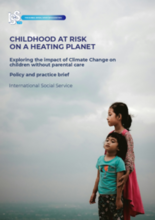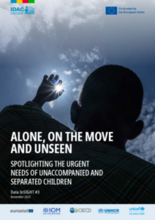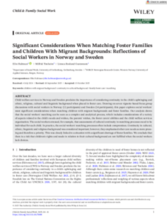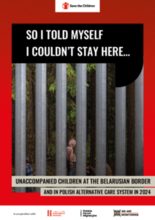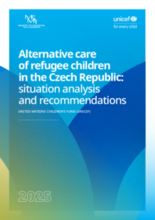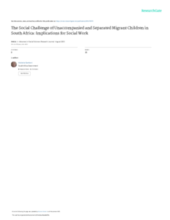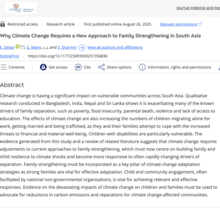Displaying 1 - 10 of 839
This chapter in the The Routledge Handbook of Social Work and Migration focuses on social work with children and young people who have experienced forced migration and become separated from family members, known as unaccompanied minors. It explores the possibilities of rights-based practice with unaccompanied children and considers what might be needed to develop and sustain this.
Cross-border case management (CBCM) is a component of child protection case management that supports children on the move and their families who cross international borders, requiring identification and registration, safe cross-border information sharing, and coordinated action among authorities across jurisdictions. This programmatic guidance provides practitioners with recommendations to implement CBCM in line with international refugee protection standards and the best interests of the child, emphasizing engagement with national authorities, continuity of protection, durable solutions, and the upholding of children’s rights within broader child protection systems.
This policy paper examines Egypt’s protection framework for unaccompanied and separated migrant children, highlighting both significant recent advances, such as national SOPs, a new asylum law, and expanded residence permits, and persistent challenges related to legal visibility, registration delays, and service access. It proposes actionable reforms to strengthen legal, administrative, and service systems, including expanding family-based alternative care to migrant and refugee children, developing child-friendly asylum procedures, and better integrating NGO, refugee-led, and community-based support into state structures.
Climate change is increasingly recognized as a child rights crisis, with children without parental care being particularly vulnerable to its impacts. This brief highlights how climate change heightens risks of losing parental care, creates unaccompanied children, and disrupts alternative care systems, and it offers recommendations for policymakers and practitioners to prevent separation and protect these children.
This brief by the International Data Alliance for Children on the Move (IDAC) calls for urgent global action to close these data gaps and strengthen evidence-based policies that uphold the rights of unaccompanied and separated children. Based on a 2025 literature review of more than 200 sources, it identifies key trends by age, gender, migration status and route, and other variables.
This study, based on vignette-based focus group discussions with social workers in Norway and Sweden, examines how they balance children’s cultural, ethnic, religious, and linguistic continuity with other needs when matching migrant-background children with foster families, revealing a complex process shaped by the child’s and parents’ wishes, foster carers’ capacities, and organizational constraints. While social workers value cultural continuity, they often prioritize more urgent care needs—especially amid a significant shortage of foster families—creating a risk that children’s rights and needs related to their cultural background may not be fully met.
The report is an attempt to capture the complex and difficult situation faced by unaccompanied children seeking international protection at the Polish-Belarusian border. It describes the legal and factual state of affairs in 2024.
The Ministry of Education, Youth and Sports (MoEYS) and the UNICEF Refugee Response Office in the Czech Republic commissioned this report to assess the situation of refugee children in alternative care. While examining the broader system and identifying how this system can be improved, the analysis pays particular attention to the needs of refugee children from Ukraine following the significant increase in refugee arrivals since 2022.
This paper reviews the challenges faced by unaccompanied and separated migrant children (USMC) in South Africa and the implications for social work practice. It highlights how social workers often lack adequate training and resources to meet the complex, multicultural needs of USMC, emphasizing cross-cultural social work as the most appropriate model for support.
Research across Bangladesh, India, Nepal, and Sri Lanka shows that climate change is intensifying drivers of family separation—including poverty, food insecurity, child migration, early marriage, and trafficking—while placing children with disabilities at heightened risk. The study calls for family strengthening to be a central pillar of climate adaptation strategies, emphasizing resilience-building, child and community engagement, and advocacy for both emission reductions and reparations for affected communities.

